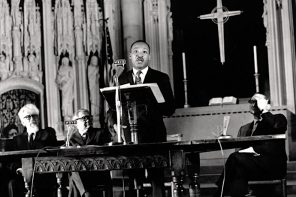While the parades of Fat Tuesday, thronged with tourists, are the very definition of New Orleans Mardi Gras in our cultural imagination, the carnival season actually begins on January 6th. One of the early events is the Krewe du Vieux, a parade that is—if such a thing is possible—more transgressive, more out there, than those of the big day.
I had heard about one club that marches in Krewe du Vieux, that, as a recent Jewish transplant to the Big Easy, I really had to see for myself: the Krewe du Jieux.
It was a warm, sunny afternoon, Saturday, January 19, and the streets of the French Quarter were teeming with day-drinkers long before that night’s parades lined up.
Krewe du Vieux is one of the best loved and crudest of carnival season spectacles. The parade’s theme was “Krewe du Vieux Comes Early,” playing on the early date of Mardi Gras this year and the adult themes of many of the parade’s sub-krewes. One float featured an oversized Energizer Bunny (“He Keeps Coming”) with a giant erection. Other floats focused on civic grievances—one float mocking Governor Jindal’s health care policy. Another float predicted the death of local journalism with an altar of skulls and the riddle: “What’s Black and White and Dead All Over?” The smaller and lesser-known “Krewe Delusion” followed with its own share of satire and adult themes.
And then there was the Krewe du Jieux, a marching club in Krewe Delusion that uses anti-anti-Semitic comedy as its theme. Dressed up as bankers, judges, and media moguls, complete with plastic noses and blue horns, krewe members schlepped alongside a float that proclaimed a Jieux World Order. Think Borat, and then some.
How did this come about, and what were they thinking?
Everyone knows that Mardi Gras is about public drinking and debauchery, but the parade tradition is about more than drunken tourists and cheap plastic beads. New Orleans’ Mardi Gras parades began in 1857, with the Mistick Krewe of Comus, a secret society that wanted to emulate the Mardi Gras parades of Mobile, Alabama.
From the start, Mardi Gras krewes were exclusive, elite clubs. Such organizations can be important networking opportunities in a small community like New Orleans, where people are used to doing business with neighbors they know, like, and trust. Of course, part of the allure of belonging to an elite club is the understanding that not just anyone is allowed in. Membership restrictions mirrored the prejudices of the time and certain segments of society were excluded from parades, parties, clubs, and the chance to rub elbows with dealmakers and power brokers. Today non-discrimination membership policies are a prerequisite to parading through public streets. However, some of the oldest clubs, including the original Comus, have stopped parading because they would rather not disclose their membership standards.
Jews were often, but not always, excluded from these patently goyisha festivities. In 1872 the first Rex, “King of Carnival,” was Jewish businessman Louis Solomon. But by the mid-twentieth century, the notable and obvious exclusion of prominent Jews from Mardi Gras merriments had become the norm. Historians and journalists of 1960s New Orleans society observed that in order to avoid embarrassment (presumably for the sake of both themselves and their friends and neighbors), Jews who could afford to leave town during carnival season did.
But times have changed, in New Orleans and nationwide, since 1964—and while organizations like the ADL continue to monitor self-declared anti-Semitism, numbers are down in the long term.
The advance of social acceptance of Jews into American culture has perhaps been aided by the ability and willingness of many American Jews to blend in. No one has to know you are Jewish if you Anglify your last name, stop speaking Yiddish, stop wearing distinctive clothing, drop dietary regulations, pay plastic surgeons to re-shape your profile. By blending in, Jews have been able to avoid drawing unwanted attention to ourselves. And unwanted attention is one thing Jews have had plenty of.
So, if we’re so good at conforming to a generic “American” ideal and negative associations with Judaism are on the decline, why traipse through city streets on a popular parade night baiting anti-Semitic ideation, tempting onlookers to see us as all of those ugly things that we fear they may believe?
Well, for starters, Jewish humor has a history of being transgressive; mocking authority. Traditionally, the Jewish holiday of Purim was celebrated by performing parodies of the biblical story of Esther and getting too drunk to be able to tell the good guy from the bad guy. Over time these performances incorporated current events and transgressed social norms with vulgarity, ultimately giving rise to Yiddish comedic theater and modern American Jewish humor.
Freud observed distinctive elements of Jewish humor, noting in particular its self-deprecating quality. But even as distinctively Jewish humor may be seen as a deft response to the Jew-hating attitudes of others, Jews rarely take on anti-Semitism itself as the direct object of our jokes. Notable exceptions include Lenny Bruce (who joked that he found a signed confession of Christ-killing from his Uncle Morty), and Sacha Baron Cohen’s Borat. Krewe du Jieux intentionally occupies this comedic space, enacting its own ode to Borat with a “Running of the Jieuxs,” a New Orleans style second-line parade, inaugurating that year’s King and Queen of the Jieuxs.
The event involves traipsing through the streets alongside a brass band and handing out “Jew eggs,” small plastic eggs containing a yarmulke-wearing baby.
These comic spectacles are more likely to produce nervous chuckles than full-throated belly laughs. When we use self-critical, self-deprecating comments to laugh at ourselves, we invite others to laugh together with us at us. The success of Jewish American comedians is perhaps due to their ability to put non-Jews at ease, because, hey we agree with you, aren’t we ridiculous?! But I’d argue that Borat-style anti-anti-Semitic humor is structurally different. It says, “Hey, you, anti-Semite! You are the one who is ridiculous.” This is more direct, more confrontational—it snatches anti-Semitic myths and imagery out of the hands of those who would use them to oppress, bleeds them of their power, and reclaims them as objects of jest.
This approach is analogous to that of the traditionally African-American Krewe of Zulu. Scholars of American Jewish humor often draw parallels with traditions of African-American humor, and the comparison between Krewe du Jieux and the Krewe of Zulu is an easy one. Zulu has a longer and deeper history in the city, originating in a social aid and pleasure club, which is a form of social service organization that emerged to serve the needs of the black community. Zulu’s parade is one of the biggest events on Mardi Gras Day and crowds line the streets to see krewe members parade in black-face makeup, wearing grass skirts, and handing out coconuts to the crowd. Depictions of civic leaders in such stereotypically racist forms would be unheard of any other time of year. But on Mardi Gras day, Zulu owns them.
Carnival season is the ideal time for these kinds of transgressive public spectacles that challenge convention. In this respect, the traditions expressed in New Orleans carnival celebrations go back far earlier than the antebellum South. Old-world annual religious festivals in medieval and early modern Europe also had subversive qualities. During the feasting and merriment of pre-Lenten carnival celebrations, the peasantry could temporarily cast off the shackles of Church-enforced restrictions on carnal appetites. The Krewe of Zulu and Krewe du Jieux challenge a different kind of convention, the convention of political correctness, which may be more effective at driving hateful speech underground than eliminating it altogether. These krewes openly confront racist and anti-Semitic notions that may be whispered in dark recesses where, if left unchallenged, they can fester and spread.
But there is another dimension to the appeal of Krewe du Jieux. Before moving here I had not had a very strong attachment to my Jewish identity. In fact, after posting some Krewe du Jieux pictures on Facebook, my high school sweetheart commented that he’d never even known that I was Jewish. I was ambivalent about joining the krewe and uncertain about how I felt about their brand of anti-anti-Semitic social commentary. I was curious to see crowd reactions to the schtick. And while I did see a few expressions of shock and confusion in the crowd, the most common reaction was: “Throw me something, I’m Jewish, too!”
The main reason that I joined was for the opportunity to participate in New Orleans culture and tradition as an insider, a goal that can sometimes take generations to achieve in this close-knit town—a goal shared by most of the members that I spoke with on Saturday, many of whom are young newcomers to the city. Krewe du Jieux offers a chance to join in on the fun, blending Jewish and New Orleanian cultural traditions: a klezmer-inflected brass band that occasionally bursts into a jazzy rendition of Hava Nagila.
There are, of course, lots of ways to participate in carnival. Many krewes have open membership and no waiting lists. But the distinctively culturally Jewish ethos of Krewe du Jieux, satirizing Jewish stereotypes and using explicitly Jewish iconography, offers something else as well. If earlier traditions of American Jewish humor expressed anxieties about a hostile and alienating surrounding culture that was not quite sure about fully accepting Jews, anti-anti-Semitic humor may hint at anxiety about being too well assimilated into the American mainstream.
In the 19th and much of the 20th century, the challenge of the American Jewish community was how to become fully American. But synagogues and Jewish community organizations have a much different challenge today: How to remain Jewish, how to cultivate and nurture strong ties to Jewish community, identity, and culture. We have a long history, deep traditions, and have made many significant contributions to American society. We gave you bagels, for G-d’s sake!
Krewe du Jieux honors both heritage and community, with potluck holiday gatherings, second-line parades, and the chance to dance the hora through the French Quarter, tossing bagels into the crowd.




